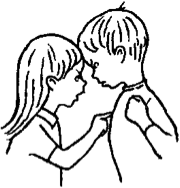 "I'll be the mom, you be the sister." This is a statement I make almost daily, usually to my oldest who is nine but sometimes to my three year old. I say this when one of my kids is trying to boss the other around. Sometimes I say it when I've asked say my son to clean up his room and one of my daughters takes it upon herself to make sure he does it. Sometimes, when I'm at work I'll say "Ms. Blank will be the teacher, you be the student." Here again, someone is trying to "take charge" and boss someone else around. It is a hard balance for kids. I appreciate when one of my kids or clients wants to help others do the right thing, but there is a good way to do it and a "bossy" way to do it. For example, I ask my son to turn off the tv and pick up his Legos. I then walk out of the room. A few minutes later, I walk back in and find my youngest daughter dragging my son by the arm over to his Legos and yelling at him to clean them up. And, FYI, the tv is still turned on. This is when I say "I'll be the mom, you be the sister." I then proceed to turn off the tv and ask my son to pick up Legos again. I remind him that if he doesn't, I will be picking them up and they will be staying with me. An example of what my clients in school share goes something like this: "I was in line to go to lunch and Johnny would not line up. The teacher announced the class would not get to go until everyone was lined up. I told Johnny to hurry up. When he still didn't come, I screamed at him to get in line." My client then received a consequence for screaming. In both examples, good intentions were involved but executed in the wrong way. In my example, I'm wanting to help my son clean up without me hovering over him. I would have given him the warning about what happens if I clean them up regardless of what my daughter was doing. By her yelling at him, though, she now is breaking the rules. In the classroom, the teacher was hoping Johnny would do the right thing by himself once he realized how it was negatively effected his classmates. By screaming, my client caused a disruption. In either situation, a polite but firm reminder from sister/classmate could have been appropriate. The question is how to how help the "helper" understand this. This is tough. Especially because sometimes I do ask for help. Sometimes, I'll send one of my kids to remind my other kids something and maybe they do it by yelling and I'm not aware. And I'm sure in the classroom, sometimes it is effective to yell at a classmate in order to get something done and the teacher does not catch them. I think we as the parent or other adults in charge need to be careful about monitoring how the helper does things. This is so hard though! We can't be everywhere, all the time. Also, we need to show them positive examples. I've yelled at my kids before and then they did what I'm asked. I imagine that is why my kids do it to each other. I am constantly working to improve this in myself and hopefully my kid too. I'm also trying to watch how often I send my kids to tell the other one to do something. That's really my job, not theirs.
0 Comments
Leave a Reply. |
JENNIFER EULBERG, MA, LPCWelcome Jennifer, our new blogger!
Jennifer is a counselor at Sandhill who specializes in depression, self-esteem, and grief & loss. Get to know Jennifer as she shares her perspectives on life, contemplates value themes, and offers gentle encouragement. THANK YOU to Stefanie Pisarkiewicz, LPC for her blog contributions from November 2014 - February 2019! Archives
May 2024
Categories |
|
CALL TO SCHEDULE AN APPOINTMENT
636-379-1779 |
|
Locations:
801 S. Woodlawn Avenue, Suite 15, O'Fallon, MO 63366 13303 Tesson Ferry Road, Suite 50, St. Louis, MO 63128 Email: [email protected] Phone: 636-379-1779 • Fax: 636-634-3496 |
